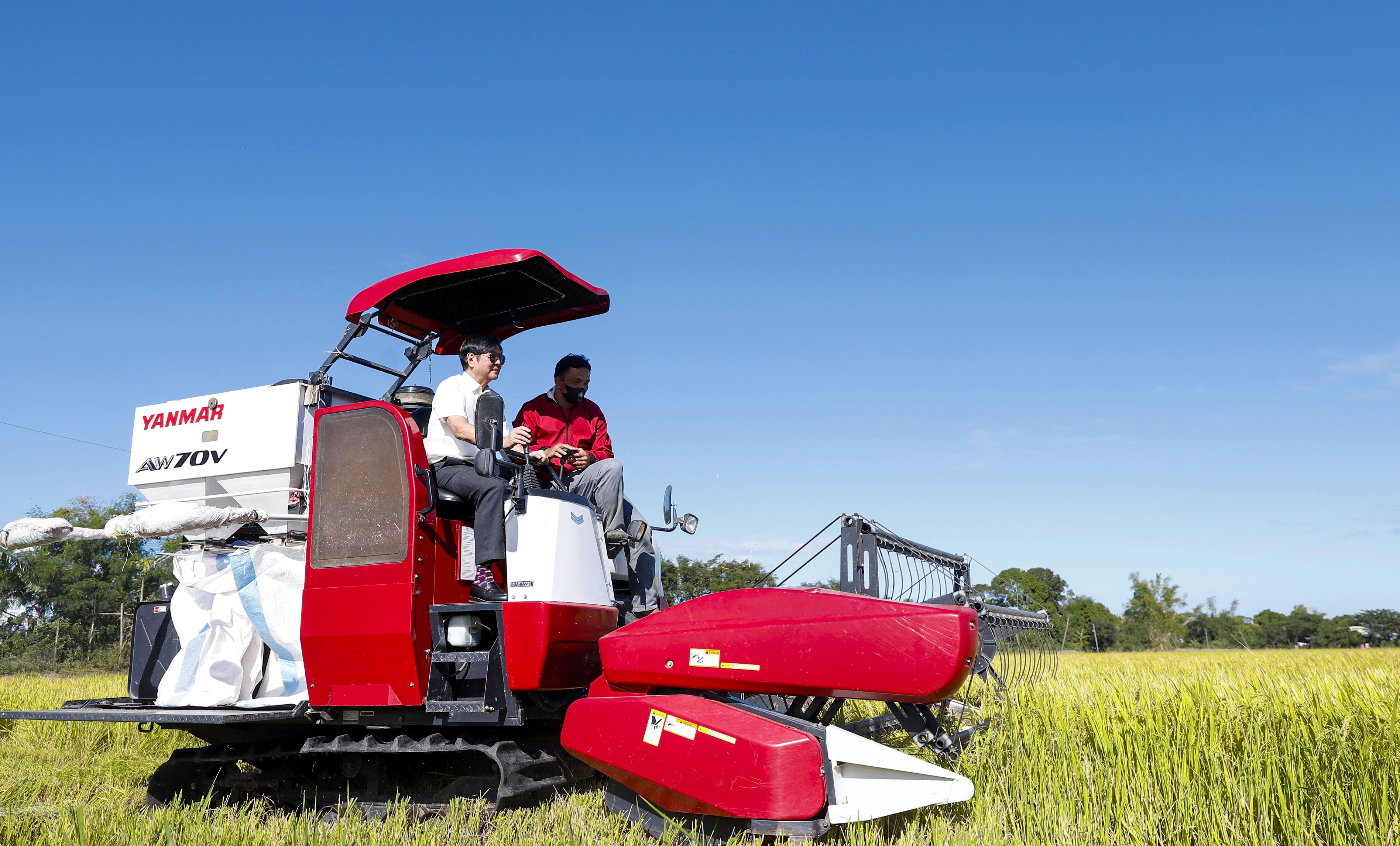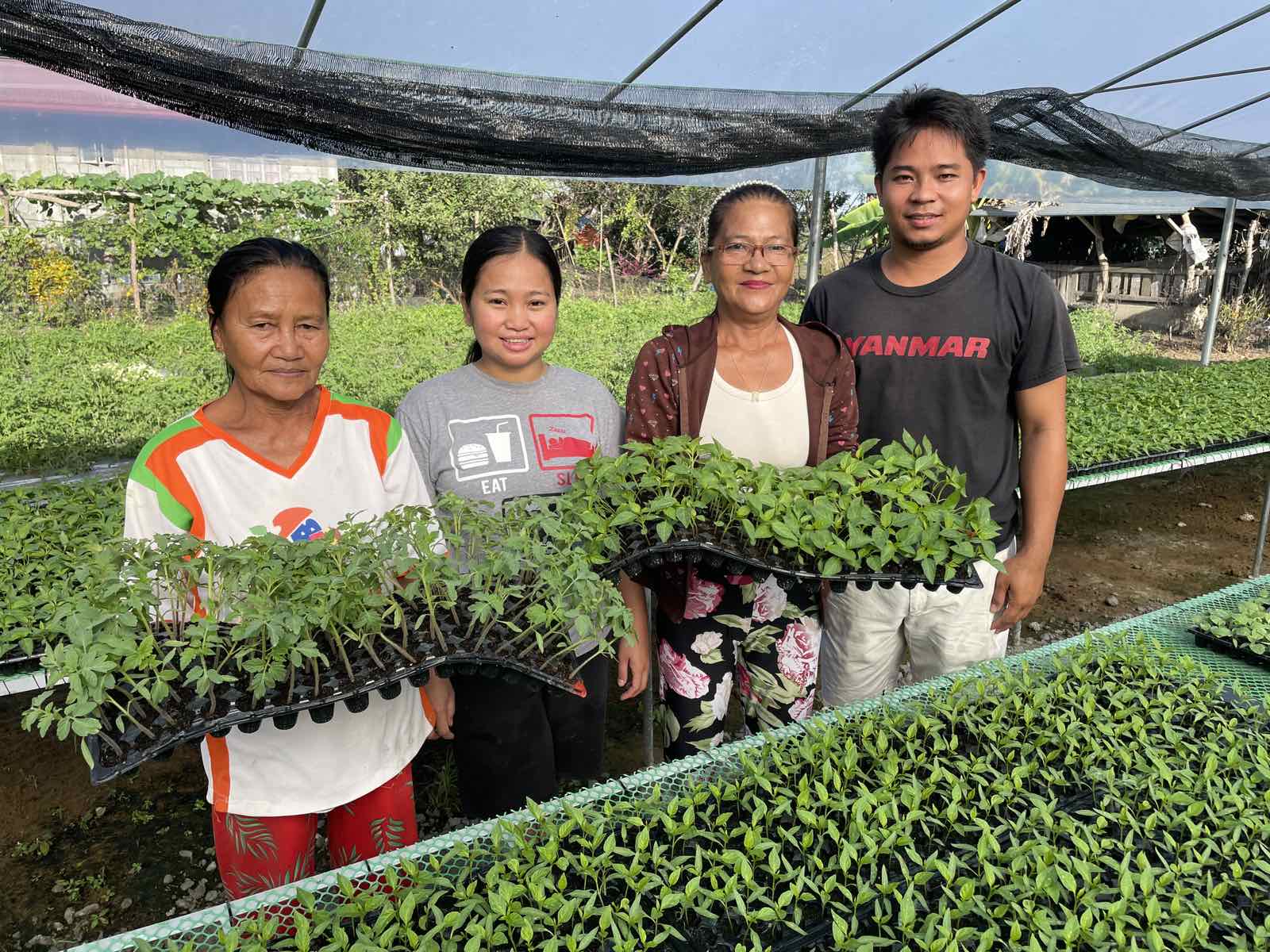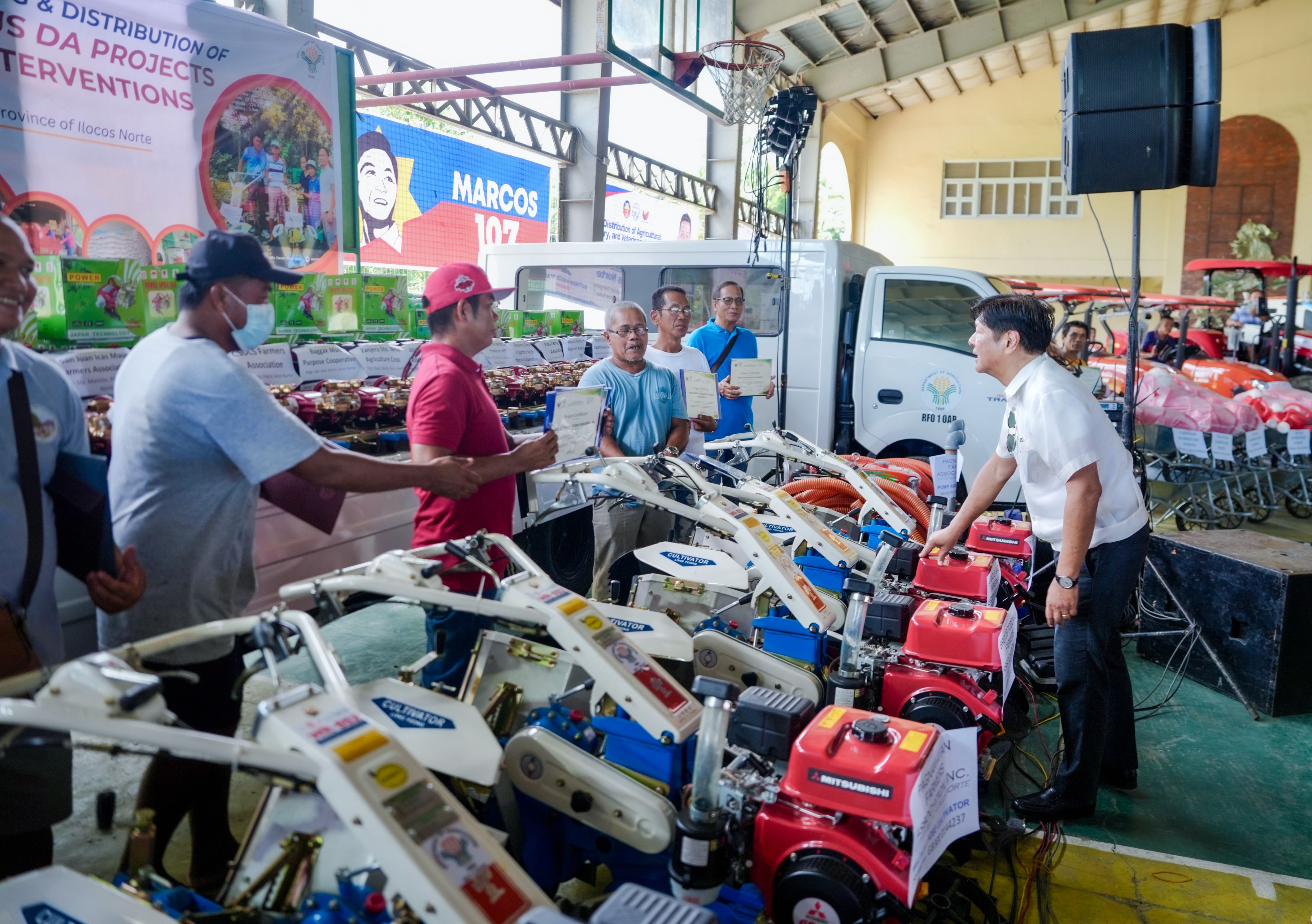The Young Pinoy and Agriculture: Bridging the gap
Technology proves farming in PH is now easy, efficient, fun and promising
Many think the problem with Philippine agriculture can always be described in four words—the price of rice.
But the country’s problem with the price of rice is a mere symptom that’s a result of countless factors.
These factors include climate change and nearly 50 years of government passing over Philippine agriculture for other development priorities.
The backward state of Philippine agriculture was why President Ferdinand R. Marcos Jr. initially took the helm of the agriculture sector in 2022.
For President Ferdinand R. Marcos Jr., attaining food security sits on top of his development agenda in a time where the precepts of sustainability remained paramount all over the world.

Ever the hands-on leader, the President dissected all the problems besetting Philippine agriculture and had the Department of Agriculture (DA) come up with fast and extensive solutions to each one of them.
One of the problems that bears heavily on the country’s agriculture sector has to do with the question of who will grow the nation’s food of tomorrow?
This question echoes louder as fewer young Filipinos turn to farming—a calling often dismissed as underpaid, undervalued, and out of sync with the times.
Agriculture is seen by many as a last resort—a pursuit for older generations or those with limited access to higher education or lucrative careers.
Yet, the irony persists. In a nation celebrated for its fertile lands and rural heritage, where more than half of the population still resides in the countryside, farming has been left behind.
But all is not lost.

In recent years, glimmers of hope emerged as the nation took decisive steps to address its graying farmer population.
A renewed focus on innovation, empowerment, and modernity may yet sow the seeds for a thriving, youthful agricultural workforce.
In October 2023, Department of Agriculture (DA) Assistant Secretary Arnel V. de Mesa reported the average age of Filipino farmers has slightly increased as younger farmers join the agriculture sector.
According to de Mesa, the government’s registry system has shown that the average age of farmers in the country now stands at 49 to 50 years old, an improvement from the previous average age of 57 years old.
While the country has made gains in enticing the youth to engage in farming, President Ferdinand Marcos himself recognizes that a lot of younger Filipinos are giving the industry the side-eye—mainly due to the stereotypes attached to farming.
Many Filipinos consider farming a laborious and low-paying occupation, leading them to find jobs in the city instead.
Such an issue is counterproductive to the government’s goal of achieving food security for the years to come since for the country to achieve this, it would require the help of the next generation of farmers who would continue the work started by the current generation.

President Ferdinand R. Marcos Jr. led the distribution of PhP157.9 million in agricultural support to farmers and fisherfolk to boost farm productivity and fight hunger in Ilocos Norte onSeptember 11, 2024. (Photo: PCO)
To address this, the DA implemented several programs to entice the younger generation to hop into the agriculture sector.
To rebrand the image of agriculture among the youth, DA’s Philippine Center for Postharvest Development and Mechanization (PHilMech) launched its advocacy campaign “Youth for Mechanization” (Y4M) in 2022.
The campaign believes that farm mechanization is the key to bring back the interest of the youth in agriculture.
Y4M aims to show the younger generation that contrary to common stereotypes in the industry, farming is now easy, efficient, fun, and promising in terms of profit and productivity through farm mechanization.
“The big challenge we face is making farming profitable. The solution lies in
embracing technology-based farming methods,” Agriculture Secretary
Francisco P. Tiu Laurel Jr. said.
The campaign is being conducted alongside the implementation of the Rice
Competitiveness Enhancement Fund (RCEF) Mechanization Program, another program of the DA that seeks to provide machinery to farmers across the country to help improve their productivity and increase their income.
The Program helps Filipino farmers become competitive with those from neighboring countries through machinery grants.
Its adoption among the Farmers Cooperatives and Associations (FCAs) is expected to lessen the production cost by Php3.00/kilo and can save up to 5% of postharvest losses.
Jett Molech Subaba, one of the advocates of Y4M and the supervising science research specialist of the PhilMech-Applied Communication Division, has been traveling across the country—visiting schools, attending summits, and engaging with communities—to inspire the younger generation to embrace careers in agriculture.
According to Subaba, as of November 2024, less than 1,000 individuals have registered on Y4M’s database. Aside from this, PhilMech has also trained more than 1,000 young RCEF beneficiaries and children of farmers.
“Nais ng Y4M na i-train, i-mobilize, at i-empower ang ating mga kabataan sa
pamamagitan ng mga skills na may kaugnayan sa mechanization na kanilang
magagamit para magkaroon ng income gamit ang ating mga makinaryang ating pinamimigay kagaya ng pagiging machine operator o engine mechanic o training specialist o agri-preneur at iba pa,” Subaba told state-run Radyo Pilipinas.
“Should the younger workforce not engage in farming in the next 15 to 20 years, then our farmers will become scarce. Unti-unting hihina at mababawasan. But may magagawa tayo. If we could just show them options and guide them in this path, walang imposible,” he added.
Subaba said that by showing the youth that farming is no longer as physically taxing as it was in the past using modern technology and farm mechanization, “pwede nating ipakita sa kanila na sa pamamagitan ng mga makabagong teknolohiya, hindi na maghapong nakayuko ang ating mga magsasaka na nagtatanim.”
“Pwede na silang sumakay ng transplanter o precision seeder sa pagtatanim ng palay; Pwede na maghanda ng lupa gamit ang four-wheel tractors habang nagv-vlog o pwede na magpataba ng lupa gamit ang drone o kaya ay mag-ani gamit ang rice combine harvester habang nagli-livestream that they can show to the fellow youth,” he added.
According to Subaba, instead of pushing the youth towards taking the old path, the government is creating hybrid, new, and complementary ways to engage the younger generation in agriculture.
With machinery, the agriculture industry has also become a more profitable line of work, Subaba added.
He also stressed that the government is putting so much effort into reaching the next generation of farmers in the country, such that “if we can get the youth to join this cause and advocacy, we can ensure food security. Remember that if we are talking about agriculture, we are also talking about the food of every Filipino and the food of every Filipino is very important because it gives life.”
Unlike other DA programs, the Y4M focuses on engaging the youth through
mechanization and modernization, in line with the vision of President Marcos and Secretary Tiu Laurel to transform agriculture into a dynamic, technology-driven industry that not only ensures food security but also provides sustainable livelihoods and opportunities for the next generation.
There are various networks under Y4M that its advocates can focus on based on their interests. These networks include the “Young Machinery Operators” or those who have interest in operating machines; “Young Machine Mechanics” or those who are interested in small and big engine mechanics; and “Young Mechanization Specialists” which include future trainers or resource speakers on training courses on rice mechanization or graduates of training of trainers under RCEF.
Other networks include “Young Farmers” for farmer-members or dependents who own farm lands and advocating mechanization in their area; “Young Agripreneurs” are those who own farm machines and are willing to use these for business, willing to be trained, or those who are already practitioners; and “Students Network” or students in senior high or college level who are enrolled in agriculture-related courses and are advocating the use of machines in the farm.
“Looking at the agricultural landscape, meron na tayong mga young farmers. Actually, dominated ng mga youth ngayon ang ating machinery operations. Mula pagtatanim hanggang pag-aani, yung mga kabataan natin ay very involved ngayon,” Subaba said, adding that there are machinery operators as young as 19 years old.
In the future, PhilMech aims to establish an online application where farmers can avail the services of Y4M advocates who underwent training on various skills sets such as engine machinery.
“Ang lahat ng services na ito ay ilalagay natin sa isang mobile application in the future kung saan pwede silang i-book ng ating mga kapwa magsasaka na nangangailangan ng ganitong serbisyo na kung saan ay pwede silang kumita. So added income para sa ating kabataan,” Subaba said.
In September 2024, President Marcos stressed the importance of giving land to graduates of agriculture-related courses to produce a new breed of farmers equipped with modern technology and tools.
“Kailangan natin ng mga magsasaka. Kaya’t kasama po sa charter ng Agrarian Reform Program na lahat ng mga Kabataan na dumaan at naging estudyante na dumaan sa kurso ng agrikultura ay mabibigyan din ng lupa upang ‘yung kanilang natutunan ay meron silang paglalagyan, meron silang magagamit na lupa para magamit naman nila ang kanilang bagong natutunan tungkol sa agrikultura,” he said.
Other government programs for youth in agriculture
Other than Y4M, the agriculture department has other advocacy programs for the youth.
In October 2024, young farmers Ephraim Laureta and Julius Manuel from Piddig town in Ilocos Norte returned home after their immersion programs in Taiwan under the International Farm Youth Exchange program.
Another young farmer, Windell Dela Cruz, also underwent a similar training program in Japan.
The program is being implemented by the Department of Agriculture- Agricultural Training Institute (DA-ATI) to develop deserving youth to become farmer leaders and empowered agricultural entrepreneurs in their respective areas.
According to Laureta, an out-of-school youth who lacked a college degree due to family struggles, his training inspired him to pursue cattle fattening in his barangay.
Following the program, Dela Cruz wanted to venture into cattle raising while Manuel eyed to engage into premium rice production and other high value crops.
To support their plans, DA-ATI gave them a P50,000 financial grant each to help them jumpstart their own businesses.
Agriculture Secretary Tiu Laurel said the overseas training programs underscore the DA’s continuing commitment to advance the skills of the nation’s young farmers and showcase their abilities, values, and competencies in the international arena.
“By banking on the knowledge, skills, and values of young farmers, especially in their exposure as international exchange interns, we will help usher in a Masaganang
Bagong Pilipinas filled with a globally competitive, digitally adept, and climate-resilient agricultural workforce,” Secretary Tiu Laurel said.
The DA also has the Young Farmers Challenge (YFC) program, which provides
competitive financial grant assistance to encourage the Filipino youth to engage in agriculture by providing access to capital in case they want to try agri-fishery, agribusiness and agri-entrepreneurship enterprises.
Since its launching in 2021, YFC had 3,625 beneficiaries operating their agribusiness enterprises in production, food processing, digital agriculture, and supply chain business solutions sector.